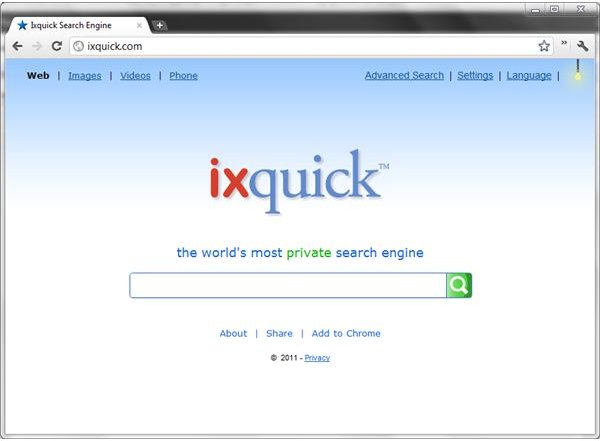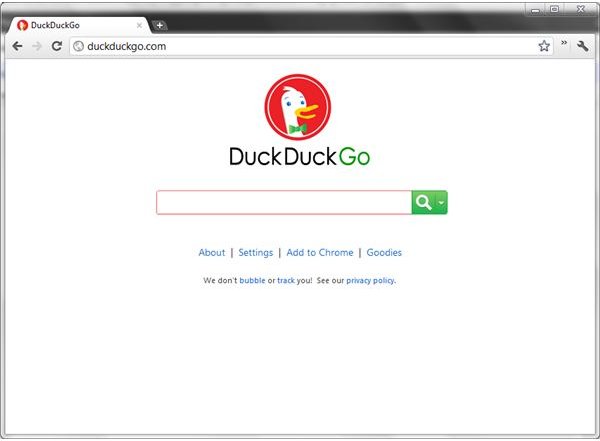Google Alternatives: Search Engines for Privacy
DuckDuckGo
DuckDuckGo is an alternative search engine that offers a variety of privacy features. DuckDuckGo doesn’t store personal information about your computer that it receives, including your IP address and Web browser information. DuckDuckGo also doesn’t use any cookies unless you change settings on its website. The cookies DuckDuckGo creates only store your search engine preferences and aren’t personally identifiable. DuckDuckGo stores a list of searches that all users perform, but can’t tie them to a specific user.
In most search engines, the search engine exposes your search query to a website you click in the search results. DuckDuckGo blocks this “leakage,” preventing the website from knowing you what you searched for.
DuckDuckGo includes HTTPS encryption support, which prevents people from snooping on your searches. When you click a search result on an encrypted search result page, DuckDuckGo automatically sends you to the encrypted version of the website, if DuckDuckGo knows the website has an encrypted version. A variety of websites include encrypted versions, including Wikipedia, Amazon.com, Facebook and Twitter.
Ixquick
Ixquick is another privacy-focused search engine. Ixquick advertises that it was the first search engine to stop storing its users’ IP addresses in 2009, although other privacy-focused search engines also don’t store IP addresses.

In addition to not storing your IP address, Ixquick also doesn’t store your IP address or use any form of tracking cookie to track your usage of its search engine. Ixquick uses a single anonymous cookie that saves your search engine preferences in your Web browser. While the Ixquick search engine shows sponsored advertisements, no personal data is shared with advertisers.
Unlike DuckDuckGo, Ixquick doesn’t even store an anonymous list of search queries. Each search query is discarded rather than saved to a log file. Ixquick also offers a secure proxy service. You can click the “Proxy” link under a search result to view the Web page over Ixquick’s proxy servers. You are anonymous to the website you visit over the proxy. Ixquick also includes HTTPS, which you can even use the proxy over.
Yippy
Yippy, formerly known as Clusty, is a search engine that doesn’t track you or store any information on you. Yippy doesn’t store a history of your searches on their servers or in your Web browser, track your activity on the Yippy website or store any personal information that you don’t offer to it. Yippy doesn’t sell users’ personal information for profit to advertisers.
Yippy, in competition with Google, also offers its own suite of cloud programs to compete with Google’s Gmail, Google Docs, Google Calendar and other services. Yippy offers free Web-based email, document management, storage and calendar applications. Yippy promises the same stringent privacy protection for your personal data.
Yippy searches your query in a variety of places, such as on Bing and Wikipedia, and prevents the most relevant results on the same page. Searches Yippy makes for you on other search engines can’t be tied to you personally, only tied to Yippy’s servers. Unfortunately, the Yippy search engine doesn’t include support for SSL encryption. People between your computer and YIppy’s servers, such as on an open Wi-Fi network, could snoop on your searches.
Scroogle
Editor’s Note: Scroogle’s service is no longer available. We left up this information for the sake of interested readers. According to the site’s creator, it is unlikely the service will return. See more here: https://searchengineland.com/scroogle-org-is-gone-forever-says-site-owner-112245

Like Google’s search results but prefer a search engine that protects your privacy? Scroogle offers the same search results as Google without storing any personal information. Searches you perform on the Scroogle website are handed off to one of 700 random proxy servers, searched on Google and exposed to you on the Scroogle Web page. This process is referred to as “scraping,” because the search results are “scraped” from the Google website and served to you on the Scroogle website.
Google only receives the IP address of the proxy server requesting the search results page and can’t tie the search to you specifically. Google only knows that a large amount of searches are coming from the individual proxy servers. Each search you make is performed from a different, random proxy server, preventing Google from even associating the searches with each other.
Scroogle doesn’t store cookies on your computer, nor does it save a history of searches performed on it. Scroogle’s access log, a list of IP addresses that access the website, are deleted within 48 hours. Scroogle also includes support for SSL, preventing other people from snooping on your searches between your computer and Scroogle’s servers.
References
-
Ixquick: Ixquick Protects Your Privacy!, https://ixquick.com/eng/protect-privacy.html
-
DuckDuckGo: Privacy, http://duckduckgo.com/privacy.html
-
Ixquick: Ixquick Proxy Explained, https://ixquick.com/proxy/eng/help.html
-
Yippy: So, Why Should You Be Using YIPPY?, http://www.yippy.com/y4prez.asp
-
Scroogle: Homepage, http://scroogle.org/
-
Screenshots provided by writer.
